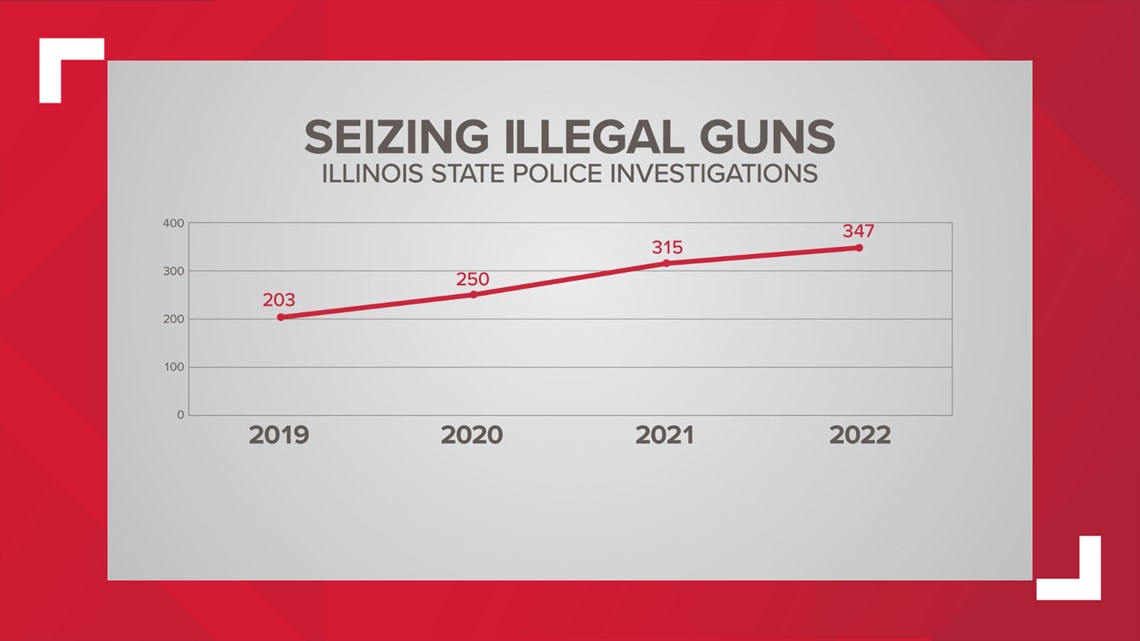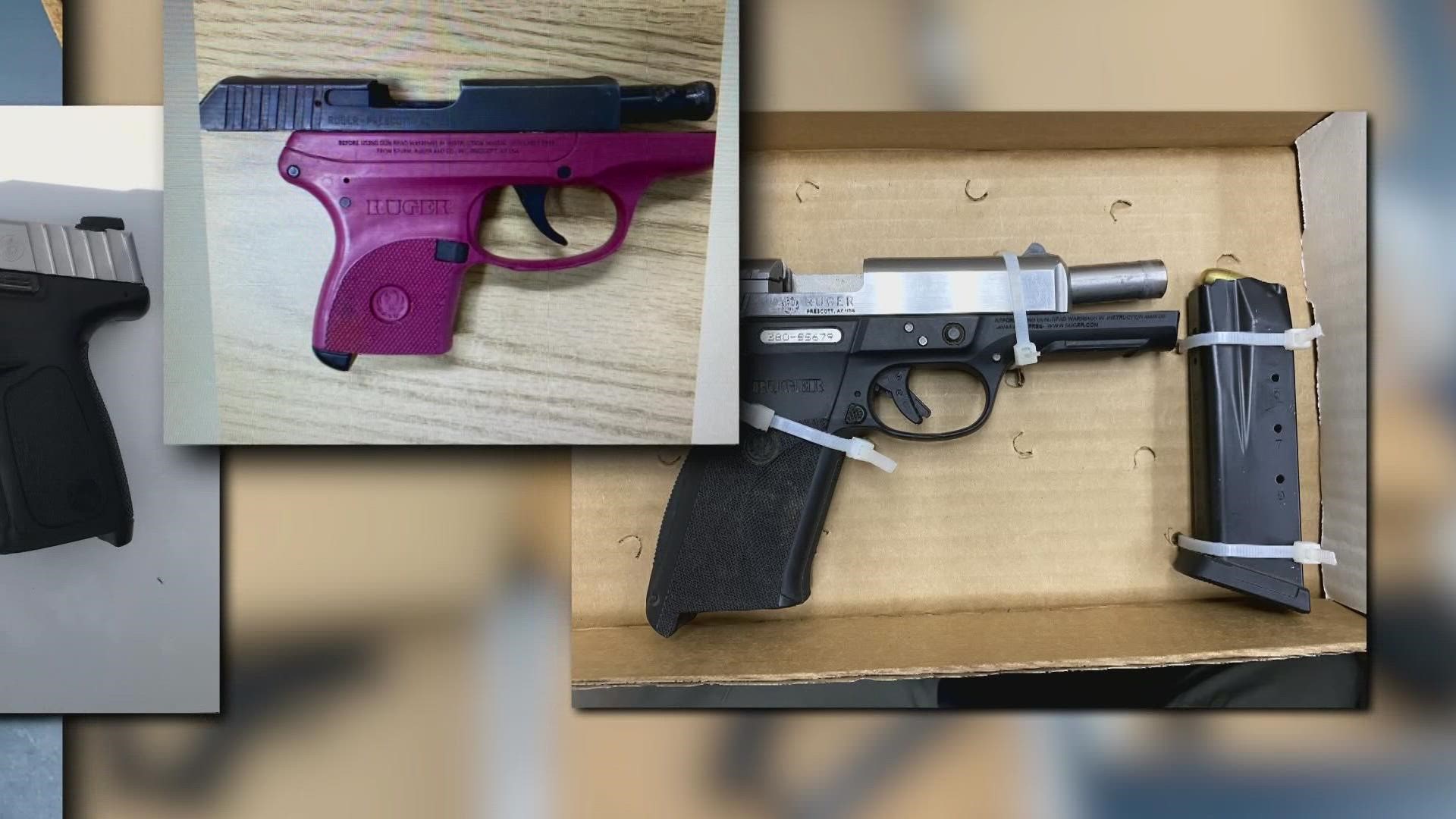COLLINSVILLE, Illinois — Illinois State Police published new statistics on Wednesday to showcase how officers have significantly stepped up enforcement of the state's Firearm Owner's Identification (FOID) Act, a law that came under intense scrutiny following a mass shooting at a July 4th parade in Highland Park.
Officers conducted 347 "details" over the course of a six-week summertime enforcement blitz designed to investigate people with revoked FOID cards. By the end of July, officers had already enforced more cases than in all of last year.
"As a result of these efforts, 1,027 individuals were placed into compliance by surrendering their FOID Cards, transferring all firearms out of their possession, and completing a Firearm Disposition Record," the agency said in a statement.
Illinois law requires a person who loses their FOID card rights to surrender their guns to someone who can legally possess them. If they can't find someone to complete the legal transfer, state police sometimes take the weapons into their possession.


State police launched the summer enforcement blitz in early June, weeks before the deadly mass shooting on the July 4th parade in Highland Park and on the heels of the mass school shooting in Uvalde, Texas.
"We will do everything in our power to prevent mass shootings and gun violence of any kind," Illinois State Police Director Brendan Kelly said.
"Since the shootings in Uvalde and Buffalo, from mid-June through the end of July, ISP conducted an intense enforcement blitz around the state focusing on those individuals who pose the greatest threat to themselves or others," Kelly, a former county prosecutor, said during a Wednesday morning press conference.
Gun laws allow police and the courts several methods to remove guns from a home. Local police can enforce temporary 'red flag' laws if courts consider someone a threat to themselves or others. Those 'red flags' often rely on tips from friends or family, and the person in question can contest the court order to restore their ability to legally own guns.
Illinois State Police can take more permanent action and revoke someone's right to own a legal gun, but the agency has struggled at times to enforce the part of that law that requires the person to surrender their weapons.
"There are thousands of individuals who refuse to do so," Kelly said. "You don't know that unless you go do the physical enforcement."
State gun laws ban felons from owning guns, but allow state police to revoke a FOID card from someone who they determine to be a "clear and present danger." The process includes an initial review and an appeal phase for the person in question.
The suspected Highland Park mass shooter attempted suicide in April 2019, and in September 2019, he said he wanted to "kill everyone," according to disturbing details spelled out in a local police report describing him as a "clear and present danger." However, Illinois State Police still approved a FOID card for him in December of 2019, just months after the initial complaint was filed.
Kelly Griffith, the acting Chief Legal Counsel for the Illinois State Police, told a panel of lawmakers last week that the initial complaint was destroyed.
"That report was actually not kept," Griffith told lawmakers on the legislative Joint Committee on Administrative Rules (JCAR).
That step has come under scrutiny since it may have played a role in state police later approving the legal purchase of the firearms used to carry out the Highland Park mass shooting.
"I think the public should have an understanding about what was done with that report," Senator John Curran (R-Downers Grove) responded.
Griffith testified before the committee because state police had filed an emergency rule with JCAR seeking power to preserve clear and present danger complaints even when there is no active or pending attempt to buy a gun.
"This was an operational decision to change the rule based on the Highland Park shooting," Griffith said.
"We can only act on the information that we have we have in front of us," Kelly said. "We cannot create information that simply isn't available to us."
Kelly said because the 19-year-old suspect was not actively trying to buy a gun at the time, state police determined he was not a clear and present danger.
"How can someone say that a threat is eminent, like right now, the threat of that person having a FOID card or having firearms is eminent or impending if there's no FOID card, if there's no application, if there's no evidence of a desire to acquire firearms," Kelly asked rhetorically.
Kelly said he did not believe the Illinois State Police made any mistakes in authorizing the legal sale of the firearms used to carry out the July 4th massacre.
"I cannot point to something that our officer did wrong," Kelly said.
He later acknowledged the officer never followed up to investigate or interview the people who made the initial complaints to local police but instead made his determination based on the information written in the deleted report.
"We have no record that there was any kind of call made," Kelly said when asked if state police carried out any further investigation into the suspect.

